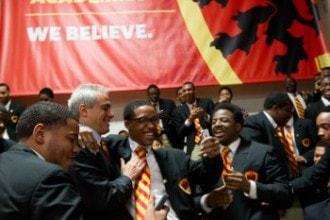by Curtis Bunn
CHICAGO — In some of Chicago’s lowest income neighborhoods, African-American teenage boys are overcoming their challenging surroundings.
They are the young men of Urban Prep Academy, an all-male charter high school with a 100 percent graduation rate. All of those students earn college scholarships. And it all starts each morning with a sort of pep rally in the school’s gym.
There is blaring music with inspirational messages. A five-piece drum band performs African-themed beats. The students — about 125 black teenagers — line up in rows, dressed in blue blazers, white shirts, red neckties and khakis.
A video appears, featuring black trailblazers from various disciplines around the world. A student leads his classmates in a punctuality pledge.
In the bleachers, principal Dion Steele grips a microphone. “You are black, proud, beautiful young men,” he tells the students. “There is a battle out there, and the battle is yours to win.”
When Steele says, “It’s time to show some love,” the students greet each other with handshakes, hugs and laughs. When they line back up, Steele updates them on the highest-scoring groups in particular classes. They cheer each other.
Then, in unison, they recite the school’s creed — a 17-line treatise that begins and ends with “We believe.” In between, its principles champion success, integrity, self-commitment, community and family.
This daily wake-up lasts about 30 minutes. It ends with Steele directing the young men to first period at 9 a.m. “Exit through the Door of Solidarity,” he says as they disperse through various parts of the gym. “Exit through the Door of Integrity. Exit through the Door of Resiliency.”
This display represents one of this dynamic charter school’s guiding principles: elevating students’ self-esteem while focusing on test scores. Eighty-five percent of the students come from single-mom homes in impoverished areas, according to Roosevelt Moneyham III, the school’s student recruitment chief. The only admissions requirement is to be a Windy City resident. A lottery selects 450 students among some 1,500 applicants to attend one of Urban Prep Academy’s three campuses in inner-city Chicago. The faculty at these schools brims with black men, a rarity in U.S. education systems.
Moneyham, a former Chicago police officer, “decided to stop arresting little brothers and find a way to keep them out of trouble,” he said.
The teachers and staff call the students “Mr.” followed by their surnames. The students refer to each other the same way.
“It took a while to get used to this school,” said Dashawn Cribbs, 17. “It’s better than I thought it would be because the teachers push you, everyone cares, and you gain a lot of pride in the process.”
This school is a return to the sometimes-controversial single-sex education system. It was founded in 2006 by Chicago educational entrepreneur Tim King and a group of African-American business, civic and education leaders.
The Englewood campus of Urban Prep is its original location, in one of this city’s most impoverished and violent regions. NBA stars Derrick Rose, Anthony Davis and Jabari Parker and singer and actress Jennifer Hudson hail from southwest Chicago, which has a 44 percent poverty rate — quadruple the 10.4 percent average across Chicago, according to the Illinois Commission on the Elimination of Poverty.
“The neighborhood doesn’t exactly inspire future success,” said Nakkia Burn, whose son, Trevon Lucas, 15, is an Urban Prep student. “He has black male mentors that really care, so the students feel connected to them. . . And they don’t just push them to get to college; they emphasize getting their degree.”
Jessie Mack, a member of the school’s first graduating class in 2010, earned a communications degree from Denison University and now works as an assistant to Urban Prep’s CEO. “My time here as a student made up for what I missed by not having a father growing up,” Mack said.
That parental element permeates the school. “It’s a personal connection many of us have,” Steele said. “We try to fill in the gaps, with positive reinforcement about their strengths as a key part of our message.”
“I was always curious about the school because I would see how the guys were dressed, in their jackets and ties,” said Malik Johnson, 16, who lives in Englewood. “You just didn’t see that in my neighborhood. . . And it’s turned out to be a great place. We love each other, but are too manly to say it. But we’re put in a position to pursue success.”
Added Moneyham: “The unbelievable part is watching some of them walk in as [kids] who don’t want to be here … and years later watching them walk across that stage at commencement as mature young men about to go off to college. . . It’s a powerful thing.”



